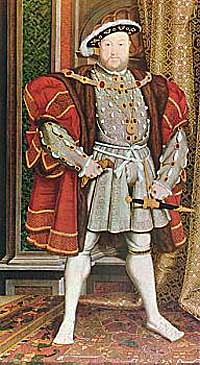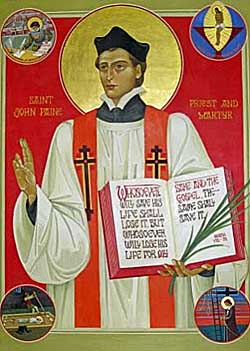

Between 1534 and 1605 a series of Acts were passed that established the Church of England as the state religion. These Acts of Parliament targeted Catholicism. In the second half of the 17th century, laws were enacted that targeted Protestant denominations.
1534: Act of Supremacy in which the Monarch (King Henry) becomes the supreme governor of Church of England.
1559: Act of Supremacy which made the Queen (Queen Elizabeth) the supreme governor of the Church of England.
1559: Act of Uniformity, which institutionalizes the Book of Common Prayer and imposes one shilling fine for failure to attend the Anglican church on Sunday.
1563: Imposition of Praemunire (forfeiture of property) if found guilty of defending papal supremacy.
1571: Treason to label the monarch heretic or schismatic (such as in a pamphlet), treason to introduce papal bulls.
1585: Treason for Jesuits or seminary priests to enter the country.
1587: Suspected recusants who failed to appear for trial were assumed guilty.
1593: Recusants restricted to within five miles of their homes.
1605: Convicted recusants to receive Anglican communion once per annum on pain of fine and eventual forfeiture of property.
1605: 1605 Recusants barred from office and professions.

John Payne (1532-1582) was a Catholic Priest and Martyr, as depicted in his icon.
St Payne is one of the Forty Catholic Martyrs of England and Wales.
He was born into a Protestant family of Peterborough, Cambridgeshire.
John Payne was ordained a priest at the Benedictine Douai Abbey in Berkshire.
He was appointed as Steward to Lord Petre of Ingatestone, but privately served as the household's priest.
He ministered to the Petres for several years, but often stayed in Warwickshire with Ann Petre, the widow of Sir William
In 1577, he was arrested but soon after released, returning to Doubai Abbey.
In 1579, he returned to Ingatestone in time for Christmas. Ingatestone had a priest hole.
In 1581, St John Payne was betrayed by George Eliot, a man who made a career of denouncing Catholics for bounty.
In 1582, St John Payne was arrested at Warwickshire and executed at Chelmsford, Essex.
We do not know what you know. Please share with us your knowledge, and help us correct any error you find in our research.